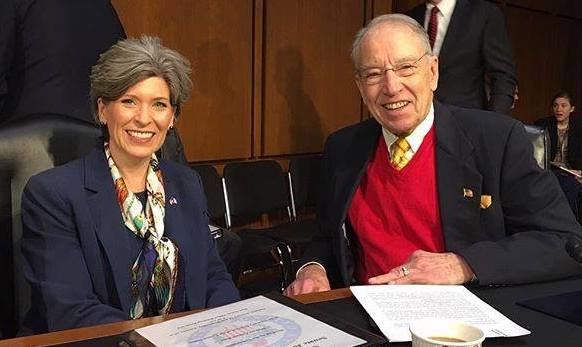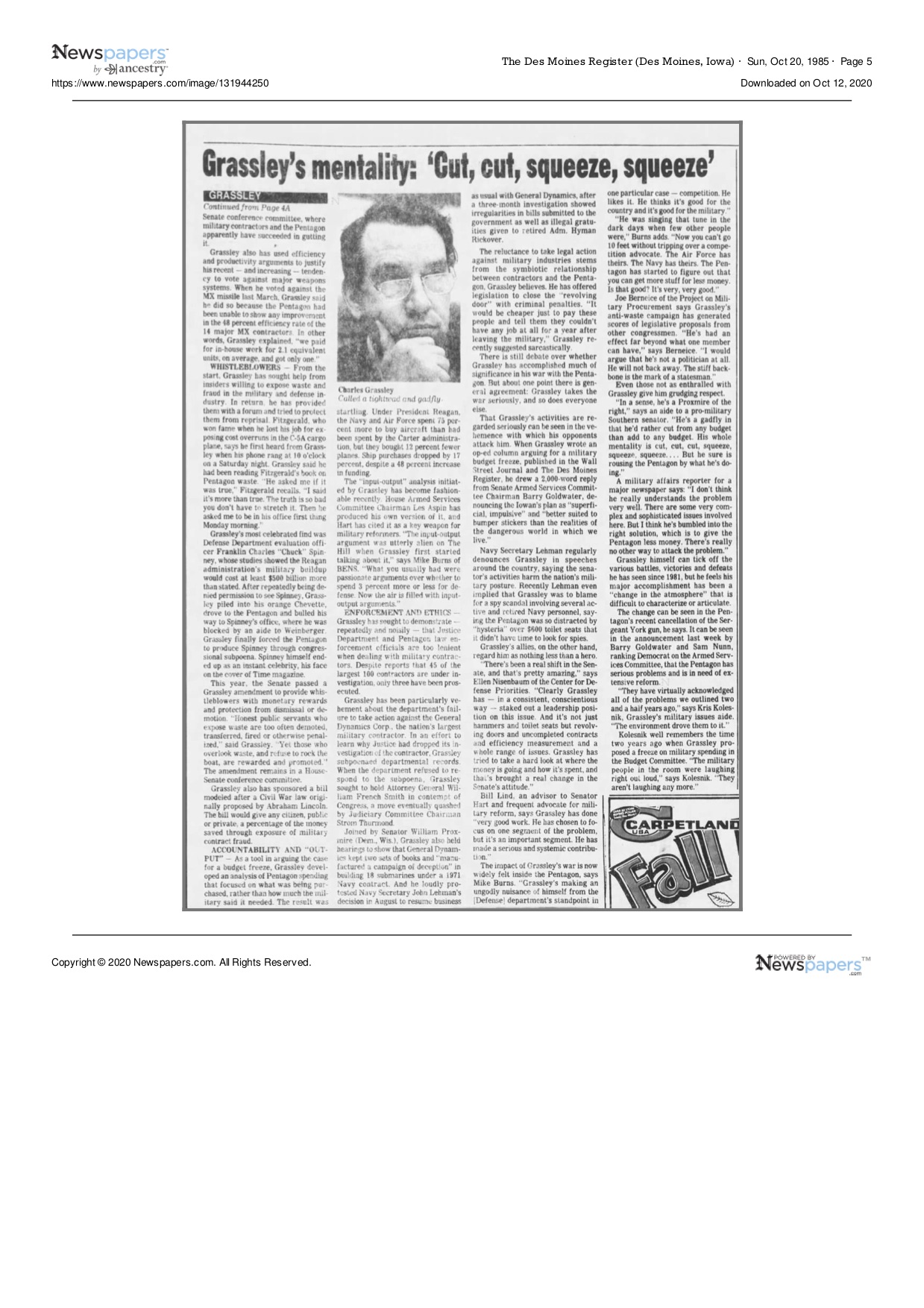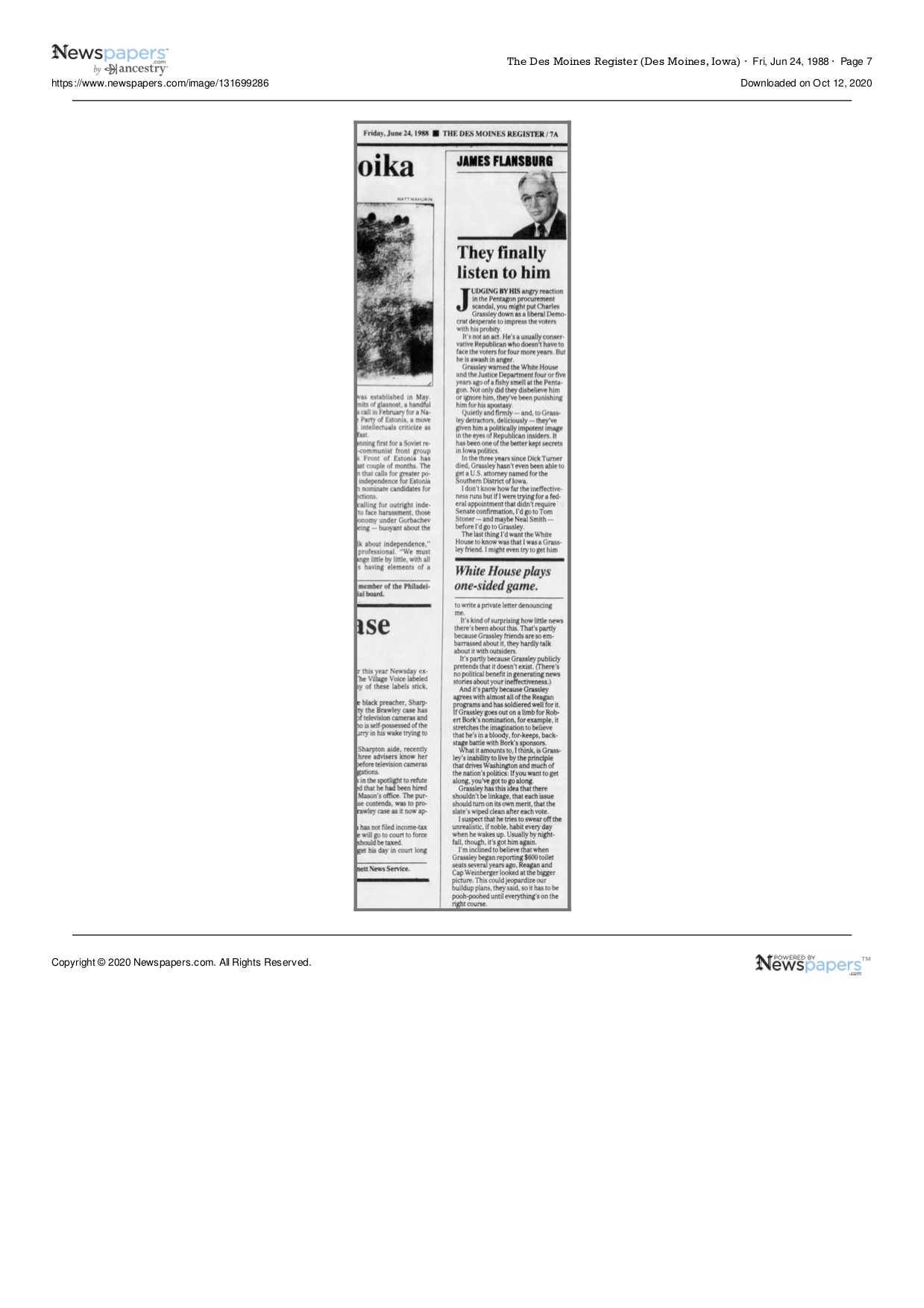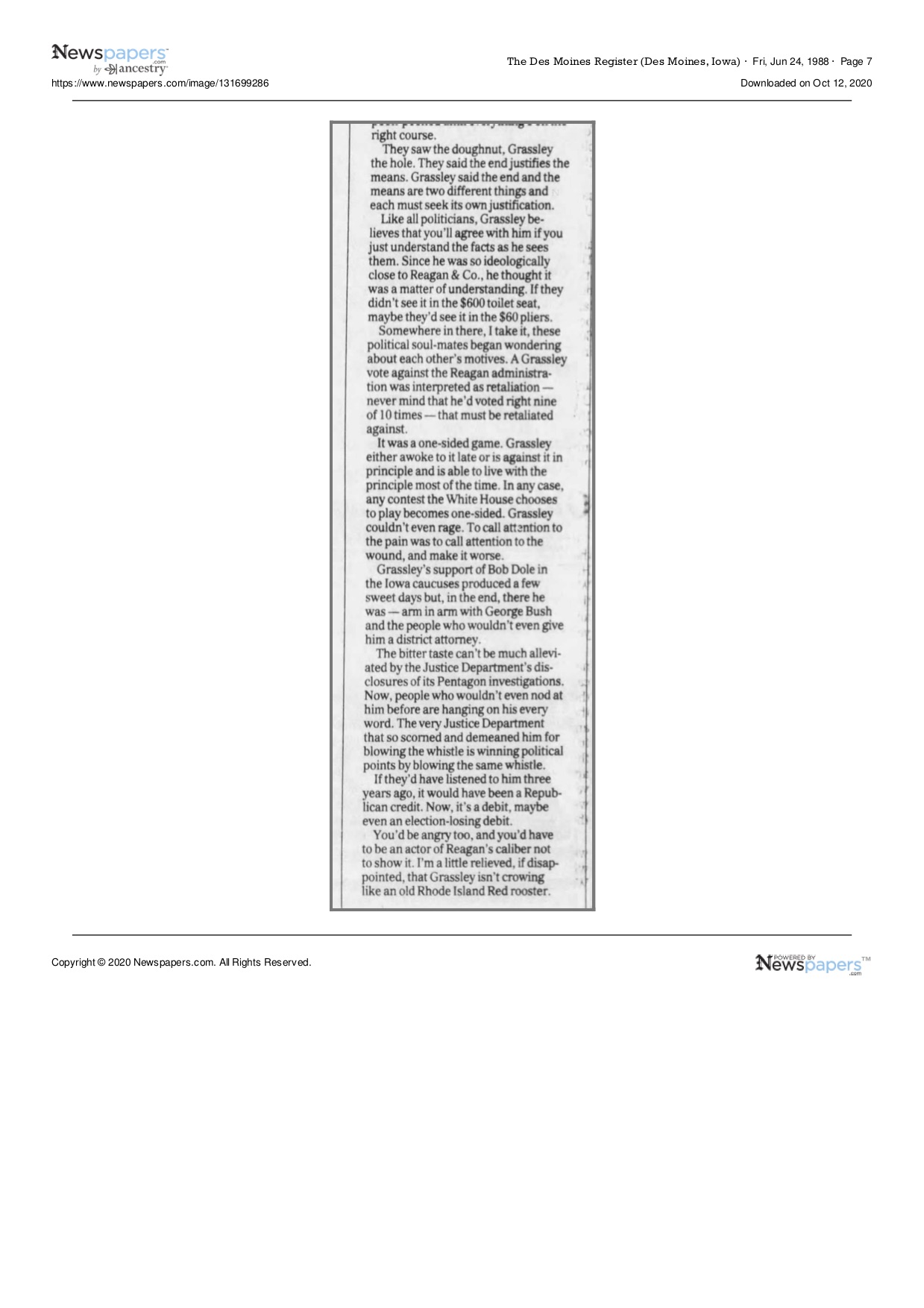Senator Joni Ernst shouldn’t be in this position.
Given Iowans’ tendency to re-elect incumbents and the state’s rightward drift this past decade, she should be running ten points ahead.
Instead, Iowa’s Senate race is universally seen as a toss-up. Ernst has led in only two polls released since the June primary. Democratic challenger Theresa Greenfield has led in fourteen polls during the same period.
Not all of Ernst’s political problems are her own creation. The COVID-19 pandemic and President Donald Trump’s disastrous leadership have put at risk several GOP-held seats that once seemed safe.
But Ernst could have set herself up better to survive a tough environment for her party. Her most important strategic error was not following the example Chuck Grassley set as a 40-something first-term senator.
“GRASSLEY’S LONG WAR WITH THE PENTAGON”
Although Grassley was considered among the more conservative U.S. senators when first elected in 1980, he quickly established a reputation as a thorn in the side of the military establishment under President Ronald Reagan.
In Hollywood, you’d call it casting against type. Republicans have long tended to support ever-increasing defense spending. But Grassley proposed a freeze in military spending and frequently highlighted waste in the defense budget. It wasn’t just showmanship. Yes, Grassley railed against $436 hammers, $640 toilet seats, a $7,622 coffee pot and “common duckbill pliers” for $1,496. But he also voted against “major weapons systems” like the MX missile.
John Hyde reviewed the efforts in an October 1985 front-page story for the Sunday Des Moines Register, titled “Grassley’s long war with the Pentagon.” Hyde recalled “spectacular episodes” such as when the senator tried “to have the U.S. attorney general held in contempt of Congress” during Reagan’s re-election campaign.
Mostly, however, Grassley’s war is fought in the trenches–at subcommittee meetings attended by a handful of reporters and even fewer senators, in speeches and articles where he argues the need for institutional change, through complicated amendments that seek to force change on an obdurate Pentagon.
Arguably, Grassley had little to show for his work. Reformers praised Grassley’s proposals, but as Hyde noted, the military budget greatly increased during Reagan’s presidency. The Associated Press reported in June 1990 that the defense budget was still covering outrageous expenses like “$999 pliers and $117 soap dish covers.” Too-costly purchases of everyday items continue at the Pentagon to this day.
Grassley did score some wins, like getting the Senate to approve new whistleblower protections during the 1980s. (Insiders aided his investigations of waste and fraud in the defense budget.)
Perhaps most important for the senator’s political future, he showed he would take on a powerful interest group usually aligned with his party. And it wasn’t kabuki theater. Republican Barry Goldwater, the chair of the Senate Armed Services Committee, publicly attacked Grassley’s military budget freeze proposal as “superficial,” “impulsive,” and ill-suited to “the realities of the dangerous world in which we live.” Reagan’s Navy secretary “regularly denounces Grassley in speeches around the country, saying the senator’s activities harm the nation’s military posture,” Hyde reported.
Grassley also was willing to sacrifice some clout in the pursuit of Pentagon reforms. James Flansburg, the Des Moines Register’s political columnist, wrote in June 1988 that Reagan’s Justice Department had “been punishing” Grassley “for his apostasy.”
Quietly and firmly–and, to Grassley detractors, deliciously–they’ve given him a politically impotent image in the eyes of Republican insiders. It has been one of the better kept secrets in Iowa politics.
In the three years since Dick Turner died, Grassley hasn’t even been able to get a U.S. attorney named for the Southern District of Iowa. […]
A Grassley vote against the Reagan administration was interpreted as retaliation–never mind that he’d voted right nine of 10 times–that must be retaliated against.
This history of conflict with a Republican president explains why many old-timers are so deeply disappointed by Grassley’s willingness to cover for Trump’s abuses of power. That’s a topic for another day.
The salient point for this discussion is that Grassley became wildly popular in a relatively short time. The party in power tends to lose seats, and that pattern held in 1986. Democrats regained control of the Senate by defeating seven of the Republicans who had won in 1980. Against that backdrop, it’s astonishing that Grassley beat his challenger John Roehrick by a two to one margin.
A LOYAL REPUBLICAN SOLDIER
Ernst leaned in to the persona of rising Republican star. Only months after her election, she delivered the GOP response to President Barack Obama’s State of the Union. She landed on Trump’s short list for vice president and gave a prime-time speech at the 2016 Republican National Convention. She joined the Senate GOP leadership team shortly after the 2018 election.
The flip side was that Ernst gained a reputation as unfailingly loyal to her party and president. As Republicans floated several bills to repeal and replace the Affordable Care Act in 2017, Capitol Hill reporters maintained “whip counts” of GOP senators whose votes were in question. Ernst was never on any of those lists, because it was obvious to all that she would support any Obamacare repeal legislation, regardless of its content or potential impact on Iowa patients and hospitals.
When Ernst was chosen as vice chair of the Senate Republican Conference, “after months of quiet campaigning” among her colleagues, I commented,
One downside to being in leadership: it guarantees that Ernst will continue being a rubber-stamp for anything and everything GOP leaders want. She won’t be able to brag about standing up for Iowans against her own party when necessary.
Indeed, Ernst has regularly presented the Republican talking points of the day on national television networks over the past two years. She also echoed the White House position throughout the impeachment process. When voting to acquit the president, she couldn’t even bring herself to voice mild criticism of Trump’s attempt to get a foreign leader to assist his re-election campaign.
Most recently, she put party over principle by reneging on a 2018 promise not to confirm a Supreme Court justice during a presidential election year.
Over six years, Ernst failed to carve out even one issue where she could consistently speak truth to Republicans in power. She claims to have opposed Trump’s tariffs, but has bent over backwards to praise his overall approach to trade policy. She has postured as standing up for Iowa ethanol producers, but often vouched for Trump’s sincerity when he promised his administration would change course on oil refinery waivers.
While Democratic-aligned groups have spent lots of money on commercials claiming that “Washington changed Joni Ernst,” the Lincoln Project’s message seems more effective to me: “You’d think Joni Ernst would stand up, speak up, and fight for us. But Iowa’s figured out Joni never had it in her to do the right thing. […] A real Iowa leader would do everything she could to protect us. A real Iowa leader would stand for what’s right, not for what’s easy.”
DIFFERENT FRAMES OF REFERENCE
In fairness to Ernst, she had some grounds to assume she didn’t need to display any political independence. Iowa Republicans romped up and down the ballot in 2014 and again two years later. Moreover, no sitting senator had lost a re-election bid here since 1984. Why couldn’t she go on to serve for decades? I certainly didn’t expect Iowa to have one of the most competitive U.S. Senate elections in 2020.
As a new senator, Grassley had a different frame of reference. Results from the six U.S. Senate races preceding his first re-election campaign:
During that era, Grassley had no reason to expect he could coast to re-election on incumbency advantages.
Ernst did embrace one element of her mentor’s winning formula, and it has become a drumbeat in this year’s campaign.
“VERY IMPORTANT TO GET OUT AND SPEAK DIRECTLY TO IOWANS”
Grassley popularized the practice of visiting all 99 counties in his official capacity every calendar year. The “full Grassley” isn’t all it’s cracked up to be; most events are closed to the public, especially in large, Democratic-leaning counties. But it has indisputably become part of the senator’s brand.
Ernst has followed suit and brings up the 99-county tour in every conceivable context. Here’s a comical exchange from the first IA-Sen debate, broadcast on Iowa PBS last month.
David Yepsen: Senator Ernst, the criticism of you is that Republicans oppose the Affordable Care Act but don’t put any alternatives on the table. We all are concerned about health care. I wonder if you could be as specific as you can about some of the types of things you want to do to fix Affordable Care or what happens if you have to replace it?
Ernst: Again, I have been out on the road, I have just completed my sixth consecutive year of the 99-county tour, very important to get out and speak directly to Iowans. My opponent has not been out to probably 40 or so counties —
Yepsen: Excuse me, Senator, this question is not about 99-county tours, it’s about the Affordable Care Act.
Ernst: Yes, and David, it is about hearing from Iowans, directly from Iowans. So when I’m out and we’re talking about those health care issues, again pre-existing conditions, one is making sure that those insurance companies are covering people with pre-existing conditions. […]
Greenfield: Well, first let me start with Senator Ernst wants to talk about travel schedules because she can’t come back to Iowa and explain to Iowans how she sold them out, sold them out to big pharma and can’t lower the prescription drug prices, sold out our farmers to big oil and put one of their people to head the EPA, sold out Iowans in general [….]
Ernst seems to have calculated that simply holding events in all counties would be enough to show she is representing Iowans well. But Grassley backed up his 99-county tours with strong constituent service and an independent streak on a few matters of national importance.
There’s another model for success in an Iowa senator’s first term. Ernst didn’t copy that one either.
THE TOM HARKIN APPROACH
Iowans elected Harkin to the House five times, beginning in 1974, and to the Senate five times, beginning in 1984. He wasn’t known for battling his own party’s establishment. And while he did travel extensively around the state, he didn’t check the box on visiting all 99 counties every year.
Rather, Harkin demonstrated his value as a fighter for Iowans by getting important bills through Congress.
The Americans with Disabilities Act would be a monumental accomplishment for any senator. Harkin championed the bill as a first-termer, and a president from the other party signed it into law.
Harkin was passionate about the cause because his older brother Frank was Deaf. In fact, he delivered a Senate floor speech in American Sign Language when the Americans with Disabilities Act passed.
The bill became a big part of Harkin’s case for re-election in 1990. Frank starred in a television commercial that year, and again in 1996.
Ernst has no comparable achievement, even though she’s been in the majority caucus for all of her six years in the Senate. During two of those years, Republicans had a trifecta in Washington. Why doesn’t Ernst have a signature bill to her name?
GOP leaders made her the point person on getting the Violence Against Women Act reauthorized, yet Ernst couldn’t deliver. She blamed Democratic intransigence, but the core problem was she wasn’t willing to stand up to the National Rifle Association on closing the “boyfriend loophole.”
Many times, Ernst claimed the Violence Against Women Act was one of her top priorities. If she had spent some of her political capital trying to move GOP senators toward broadly popular gun safety provisions in the House bill, which gained dozens of Republican votes, she’d have a stronger case to make with Iowans now.
FINAL THOUGHTS
Ernst could still win this race. Greenfield’s lead in most polls has been within the margin of error, and even if those polls are accurate, a small shift in voter sentiment could happen before election day. Nevertheless, the senator is not as well-positioned as she should be, given Iowa’s propensity to re-elect incumbents.
Dan Guild has pointed out that Ernst typically polls a little behind Trump’s re-elect number. That’s a dangerous place to be, with Trump and Joe Biden running close in recent Iowa polling.
If Ernst had shown any real independence (like Grassley during his first term) or gotten a major law enacted (like Harkin), she would probably be outperforming her party’s president.
Representation is more than 99-county tours.
______________
Appendix 1: October 20, 1985 article in the Sunday Des Moines Register by John Hyde, “Grassley’s long war with the Pentagon.” (front page and interior)
Appendix 2: June 24, 1988 column in the Des Moines Register by James Flansburg, “They finally listen to him” (top portion and bottom)
Top photo: Senators Joni Ernst and Chuck Grassley in January 2019. Cropped from a picture posted on Senator Ernst’s Facebook page.






3 Comments
Great history lesson
I did not know about the first terms of either Harkin or Grassley except that I remember the high prices for toilet seats. Your comparison of Iowa Senate turnover of the 1970s era to the recent stability is insightful.
iowavoter Fri 16 Oct 11:51 PM
Another issue that he championed but later abandoned
Does any one remember when he was trying to hold “religious” groups accountable for their attaining sketchy IRS non profit status for at least a decade. I believe when the religious right joined forces with the GOP, he quietly changed his focus on packing the courts with conservative judges to curry favor. Anyone care to elaborate?
Joni Ernst only was beholden to Koch in 2014 . She was suppose to be their good investment.It would be interesting if she was invited to their Palm Springs 2020 Annual Summit.
libre Sat 17 Oct 1:56 PM
I remember...
…and just confirmed that in 2011, there appeared an interesting story online titled “Grassley Withers Under Religious Right Heat.”
I also remember that many years ago, a small Iowa conservation group to which I belonged had to jump several hurdles to get our non-profit status, and we were careful to the point of terror not to do anything having to do with partisan politics, lest we break the rules. When I see the partisan shenanigans openly used by many fundamentalist churches now, WOW.
PrairieFan Sun 18 Oct 10:15 AM